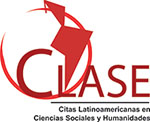Employer branding and psychosocial wellbeing
DOI:
https://doi.org/10.23857/dc.v9i1.3129Palabras clave:
Employer branding; Bienestar psicosocial; Clima laboral.Resumen
La importancia del employer branding en el proceso de reclutamiento está íntimamente relacionada con el bienestar psicosocial de las personas, ya que optimiza el nivel productivo como respuesta a un clima laboral adecuado que propicia un mejor desempeño y al mismo tiempo contribuye a la creatividad e innovación. Una empresa cuyos trabajadores están motivados permanentemente gana en productividad porque el trabajador es consciente de su compromiso con la organización que le brinda la oportunidad de crecer individualmente y encuentra satisfacción en su desempeño, mediante un balance entre la vida real y el trabajo, con una remuneración que le motiva y estimula a continuar en la búsqueda de mejores logros, un empleo seguro que le da estabilidad económica y psicológica, permite la existencia de una comunicación fluida y la cooperación interpersonal, asegurando de esta manera mejores resultados. Es evidente que un buen clima laboral incide en el estado anímico, físico y mental de los trabajadores, aporta a una mejor actitud en el trabajo, y contribuye al bienestar psicosocial.
Citas
Aln?aç?k, E., Aln?aç?k, Ü., Erat, S., & Akçin, K. (2014). Attracting Talented Employees to the Company: Do We Need Different Employer Branding Strategies in Different Cultures? Procedia. Social and Behavioral Sciences, 150, 336-344. https://doi.org/10.1016/j.sbspro.2014.09.074.
Barbera, K. M., & Schneider, B. (2014). The Oxford Handbook of Organizational Climate and Culture. Oxford University Press.
Belcourt, M., Singh, P., Snell, S. A., Morris, S. S., & Bohlander, G. (2017). Managing Human Resources (8th Canadian Ed.). Nelson Publishing.
Bonaiuto, M., De Dominicis, S., Illia, L., Rodríguez-Cánovas, B., & Lizzani, G. (2013, November 28). Managing Employer Brand Attributes to Attract Potential Future Leaders. Journal of Brand Management, 20, 779-792. http://doi.org/10.1057/bm.2013.18
Bouchard, G. (November 19, 2007). Strong Employer Brand Can Tap Scarce Resource: Talent. Canadian HR Reporter https://www.hrreporter.com/news/hr-news/strong-employer-brand-can-tap-scarce-resource-talent/311458
Bussin, M., & Diez, F. (2017). The Remuneration Handbook?: A Practical and Informative Handbook for Managing Reward and Recognition: Vol. Third updated international edition. KR Publishing.
Catano, V. M., Wiesner, W. H., Hackett, R. D., & Belcourt, M. (2019). Recruitment and Selection in Canada (7th Canadian Ed.). Nelson Education Series in Human Resource Management.
Chandler, N. (2019). Employer attractiveness: a study into the link between demographics of jobseekers and reasons for applying for a position. Journal of Human Resource Management, 22(1), 30–45.
Cyprus, S. (2022, January 27). What is a Work Climate? Smart Capital Mind. https://www.smartcapitalmind.com/what-is-a-work-climate.htm#:~:text=A%20work%20climate%20is%20the,the%20work%20environment%20is%20poor.&text=Employees%20may%20lack%20interest%20or,to%20decrease%20productivity%20even%20further.
Davies, G. (2008). Employer Branding and Its Influence on Managers. European
Journal of Marketing, 42(5–6), 667–68. http://doi.org/10.1108/03090560810862570
Dessler, G., & Chhinzer, N. (2020). Human Resources Management in Canada (14th Canadian Ed.). Pearson.
Eskenazi, J. (2021). How To Win the Hiring War. Canadian Manager, 46(4), 30–32.
Glassdoor. (2021). Glassdoor Job Search (Version 9.0.0) [Mobile app]. App Store. https://apps.apple.com/us/app/glassdoor-job-search-more/id589698942
Hughes, R., Ginnett, R., & Curphy, G. (2021). Leadership: Enhancing the Lessons of Experience (11th Ed.). McGraw-Hill.
Jain, N., & Bhatt, P. (2015, June 8). Employment preferences of job applicants: unfolding employer branding determinants. Journal of Management Development, 34(6), 634-652. https://doi.org/10.1108/JMD-09-2013-0106
John, A., & Jagathy Raj, V. P. (2020, December 31). Employer Brand and Innovative Work Behaviour: Exploring the Mediating Role of Employee Engagement. Colombo Business Journal, 11(2), 93-113. http://doi.org/10.4038/cbj.v11i2.65
Lipovac,D.,Hajdu,L.,Wie,S. & Nyrud,A.(2020).Improving Mental Wellbeing in Organizations with Targeted Psychosocial Interventions. Business Systems Research Journal,11(2) 86-98. https://doi.org/10.2478/bsrj-2020-0017
Lybrand, S. (2018, March 1). What Is Employer Branding and How Can It Grow Your Business? Employer Brand. Talent Blog. LinkedIn. https://www.linkedin.com/business/talent/blog/talent-acquisition/employer-branding
Meister, J. (2021, August 4). The Future of Work is Employee Well-Being. Forbes. https://www.forbes.com/sites/jeannemeister/2021/08/04/the-future-of-work-is-worker-well-being/?sh=486d933a4aed
Ronda, L., Valor, C., & Abril, C. (2018). Are they willing to work for you? An employee-centric view to employer brand attractiveness. Journal of Product & Brand Management, 27(5), 573-596. https://doi.org/10.1108/JPBM-07-2017-1522
Salan??, I. I., Petre, A., & Stegerean, R. (2019). Corporate Social Responsibility Effect of Employer Branding. Managerial Challenges of the Contemporary Society, 12(1), 52–56.
Schein, E. H. (1996). Career Anchors Revisited: Implications for Career Development in the 21st Century. The Academy of Management Executive (1993-2005), 10(4), 80–88.
Shankar, T., & Bhatnagar, J. (2010). Work Life Balance, Employee Engagement, Emotional Consonance/Dissonance & Turnover Intention. Indian Journal of Industrial Relations, 46(1), 74–87.
Skeeled. (n.d.). How to Evaluate the Effectiveness of Your Talent Acquisition Strategy. HRTech247. https://hrtech247.com/how-to-evaluate-the-effectiveness-of-your-talent-acquisition-strategy/
Skýpalová, R., Vencourová, M., & Hynková, V. (2021). Trends in Strategic Human Resource Management: Employer Brand Attractiveness. Ad Alta: Journal of Interdisciplinary Research, 292–297.
Sokolova, S. (2015, February 9). The Importance of Creativity and Innovation in Business. Facebook. https://www.linkedin.com/pulse/importance-creativity-innovation-business-siyana-sokolova/
Universum. (2020). World's Most Attractive Employers 2020. Research from Universum reveals the motivations of university graduates as they enter the global workforce. https://universumglobal.com/wmae2020/
Universum. (2017, July 26). Industry Reputation and Global Spread Defines Future Earnings in the Candidate's Eyes. Employer Branding Research. https://universumglobal.com/blog/industry-reputation-global-spread-defines-future-earnings-candidates-eyes/
Wells, C., Malik, R. F., & Edmondson, V. C. (2021). The Influence of Diversity Climate on Employer Branding: 2020 and Beyond. IUP Journal of Brand Management, 18(1), 32–47.
Wilden, R. M., Gudergan, S., & Lings, I. N. (2010) Employer branding: Strategic implications for staff recruitment. Journal of Marketing Management 26(1 –2): 56 –73.
Publicado
Cómo citar
Número
Sección
Licencia
Derechos de autor 2023 Andrea del Rocío Mejía Rubio, Daniela Monserrath Mejía Rubio

Esta obra está bajo una licencia internacional Creative Commons Atribución 4.0.
Authors retain copyright and guarantee the Journal the right to be the first publication of the work. These are covered by a Creative Commons (CC BY-NC-ND 4.0) license that allows others to share the work with an acknowledgment of the work authorship and the initial publication in this journal.






